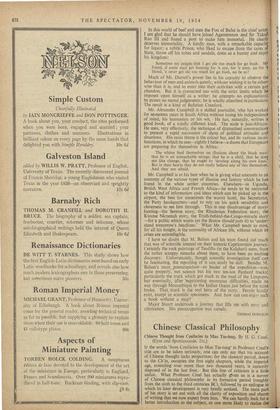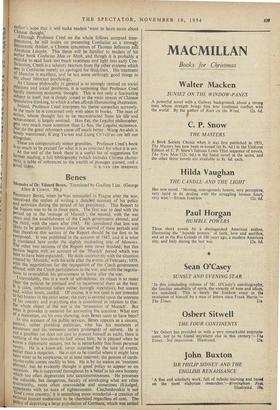Chinese Classical Philosophy
Chinese Thought from Confucius to Mao Tse-tung. By H. G. Creel. (Eyre and Spottiswoode. 21s.)
IF the words 'from Confucius to Mao Tse-tung' in Professor Creel's title are to be taken seriously, one can only say that his account of Chinese thought lacks proportion; for the classical period, down to the Ch'in, occupies the first eight chapters, while the imperial age, extending over more than two thousand years, is cursorily disposed of in the last four. But this line of criticism is a little unfair. What Professor Creel has actually given us is a survey of Chinese classical philosophy in its formative period (roughly from the sixth to the third centuries BC), followed by an epilogue in which its later development is very briefly noticed. The main part of his story is set out with all the clarity of exposition and charm of writing that we now expect from him. We can hardly look for a better introduction to the subject, or one more likely to realise the
author's hope that it will make readers 'want to learn more about Chinese thought.'
Although Professor Creel on the whole follows accepted inter- pretations, he still insists on presenting Confucius as a strong democratic thinker, a Chinese syncretism of Thomas Jefferson and Abraham Lincoln. This thesis will be familiar to readers of his earlier book Confucius Man or Myth, and though it is probably a mistake to read back too much sweetness and light into early Con- fucianism, Creels is a salutary reaction from the other extreme which sees in Confucius merely an apologist for feudalism. His treatment of Mencius is excellent, and he has some strikingly good things to SaY about Mencian psychology,
As Chinese philosophy in general is so strongly centred on social relations and social problems, it is surprising that Professor Creel hardly mentions economic thought. This is not only a fascinating subject in itself, but is closely joined to the main stream of Chinese speculative thinking, to which it often affords illuminating illustration. Indeed, Professor Creel interprets his theme somewhat narrowly. In the main he is concerned only with ideas in books. The man of action, whose thought has to be reconstructed from his life and achievement, is largely omitted. Han Fei, the Legalist philosopher, gets very much more attention than Li Ssu, the Legalist statesman. Nor do the great reformers come off much better. Wang An-shih is barely mentioned; K'ang Yu-wei and Liang Ch'i-ch'ao are left out altogether.
, These are comparatively minor grumbles. Professor Creel's book IS as much to be praised for what it is as criticised for what it is not. At the end of the book there is a useful list of suggestions for further reading, a full bibliography (which includes Chinese charac- ters), a table of references to the wealth of passages quoted, and a











































































 Previous page
Previous page